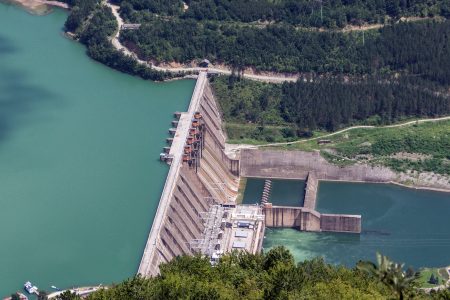
While previous attempts to integrate South-Eastern Europe’s electricity markets appeared to have stalled, they have been given a new dynamism amid a collective push for EU membership and a looming punitive CO2 duty.
South-Eastern Europe—including Ukraine, Moldova, and Georgia—has long sought to join the European Union, which the designated European Commission President Ursula von der Leyen said is in “Europe’s strategic and security interests.”
But at the technical level, the process has been slow. For almost 20 years, the Vienna-based Energy Community secretariat has laboured to prepare the energy markets of countries like Montenegro and Albania for energy market integration.
On 3 July, at the annual informal meeting hosted in Bosnia and Herzegovina’s Banja Luka, Brussels came to town to read the law to the gathered energy and environment ministers.
“The Contracting Parties are urged to accelerate the transposition and implementation of the Electricity Integration Package without further delays,” said the EU’s Deputy Director of DG ENER, Mechthild Wörsdörfer.
All would-be members of the community had missed the December 2023 deadline to couple their power markets.
Yet, the mood was optimistic – counterintuitively in part because a massive regional power blackout in late June had focused minds on the importance of grid integration and spurred deeper cooperation.
On 21 July, the power went out in several Balkan countries likely owing to a line fault compounded by a demand spike owing to high temperatures – the after-action assessment was added to the Banja Luka agenda last minute.
A line here on the blackouts and a link
Attendees in Banja Luka had shown “real engagement,” Artur Lorkowski, the head of the secretariat, told Euractiv.
Beyond blackouts, two major factors have changed the dynamic.
Firstly, all Energy Community countries except Kosovo are now in formal talks to join the EU, giving a previously vague project a “concrete destination,” explained Lorkowski, a former Polish diplomat.
This has resulted in all of the government becoming involved, much like during the drafting of the region’s long-term climate plans (NECPs) “That created maturity that probably was not there in the previous stages” said Lorkowski.
Ukraine submitted theirs on 25 June, and others in the region are expected shortly – while the plans of more than 20 EU countries remain outstanding.
At the same time, the EU’s CO2 duty, the Carbon Border Adjustment Mechanism (CBAM), will enter into force from 2026 – and immediately penalise power exports from Bosnia and Herzegovina, Montenegro and North Macedonia to the EU. These countries would need to hand over millions of euros each year to EU countries in CO2 tariffs.
Earnings from power exports help keep domestic prices low. Here, “electricity is a human right,” explains the Pole.
The region can push back CBAM’s impact until 2030, but to do this they must integrate its power markets. Wörsdörfer agreed, when asked by Euractiv, that the tariff is a push factor to accelerate adoption of the necessary laws.
Carbon crash looms
The second big-ticket agenda item in Banja Luka was confronting would-be EU members with a key cost of entry: rigorous domestic carbon pricing.
When a country like Moldova joins the EU sometime around 2030, carbon pricing could cause its energy intensive industries to suffer a “carbon shock” and go under, fear governement officials who spoke to Euractiv.
But introducing a CO2 price “with the overall goal of joining the EU ETS” remains a “key aspect,” explained Diana Acconcia, director for international affairs at the Commission’s climate department.
So the goal is to acclimate South-Eastern economies to carbon pricing incrementally – ministers were presented with three choices: price CO2 from power generation only; include basic goods like cement and steel to match the EU’s CBAM; or introduce the entire scheme.
Impact assessments for each option will be shared at stakeholder meetings on 20 September and 24 October before final findings are presented at a formal ministerial on 12 December.
Meanwhile “full transposition” of the measuring and reporting framework – the basis of any EU-compliant carbon price – should go ahead, said Acconcia.
Fait accompli?
Not all Energy Community countries all are overjoyed by the prospects of EU-equivalent carbon pricing within ten years.
“Frankly, we think that carbon pricing in general or CBAM would not be necessary at this stage,” explained Getoar Mjeku, Kosovo’s deputy minister of economy, adding that few industries had relocated to his country – meaning the risk of carbon leakage was low.
Additionally, his country had yet to “consult with civil society” on the matter, Mjeku noted, asking for leeway from Brussels.
Others complain about the workload associated with integrating power markets – all would-be EU members were asked to adopt the EU’s power market revamp from the late 2010s, by the end of 2023.
Being asked to adopt “nine pieces of directives and regulations in just one year … while the European Union implemented it over more than a decade … is incomparable,” said Constantin Borosan, Moldova’s state secretary for energy.
[Edited by Donagh Cagney/Alice Taylor]
*The Energy Community paid for Euractiv’s trip to the gathering
Take the Survey at https://survey.energynewsbeat.com/






